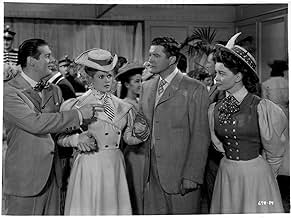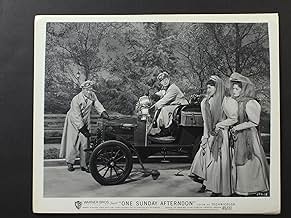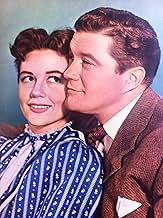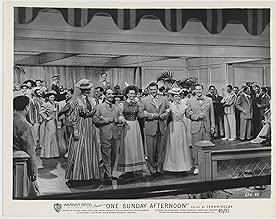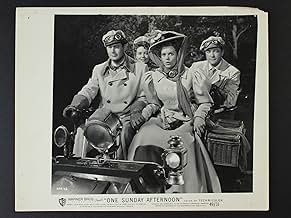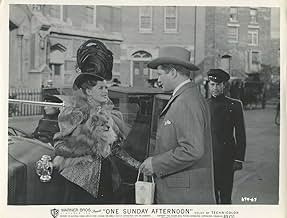VALUTAZIONE IMDb
5,7/10
345
LA TUA VALUTAZIONE
Aggiungi una trama nella tua linguaBiff Grimes has spent the last ten years regretting that he hadn't married Virginia Brush, the girl of his dreams. Virginia ran off and married his best friend - breaking his heart. Virginia... Leggi tuttoBiff Grimes has spent the last ten years regretting that he hadn't married Virginia Brush, the girl of his dreams. Virginia ran off and married his best friend - breaking his heart. Virginia's best friend, Amy, consoles Biff.Biff Grimes has spent the last ten years regretting that he hadn't married Virginia Brush, the girl of his dreams. Virginia ran off and married his best friend - breaking his heart. Virginia's best friend, Amy, consoles Biff.
Don DeFore
- Hugo Barnstead
- (as Don De Fore)
Layne Arlene
- Henry's Wife
- (non citato nei titoli originali)
Gail Bonney
- Vocalist
- (non citato nei titoli originali)
Tex Brodus
- Dancer on Boat
- (non citato nei titoli originali)
Doria Caron
- Jasper's Wife
- (non citato nei titoli originali)
Chester Conklin
- Clerk
- (non citato nei titoli originali)
Virginia Cruzon
- Girl on Steps
- (non citato nei titoli originali)
Roy Damron
- Yale Boy
- (non citato nei titoli originali)
Tom Dugan
- Sign Painter
- (non citato nei titoli originali)
Ralph Dunn
- Charlie Brown
- (non citato nei titoli originali)
Mary Field
- Barnstead's Secretary
- (non citato nei titoli originali)
Dorothy Ford
- Daisy
- (non citato nei titoli originali)
Recensioni in evidenza
How can you outsing, outact and outdance Jimmy Cagney? Maybe you can't. At least Dennis Morgan didn't here in this film with the same characters and basic plot as 1941's Strawberry Blonde. Both films are colorful and feature a lighthearted glimpse at a turn-of-the-century romance, but 'Blonde' trumps 'Sunday' in almost every regard. Can anyone portray a brawling, impish, but lovable Irishman better than Cagney? No, and I am surprised that Director Raoul Walsh and Sunday's producers thought that a mere seven years after the release of Strawberry Blonde, people would forget how great Jimmy really was. There's another problem with this film, too. In both romances, Virginia is the femme-fatale that all men crave, while Amy is a mousy suffragette type that even Biff sees as second-best. In the first film, Virginia is Rita Hayworth and Amy is Olivia DeHavilland, while in the re-make, Virginia is Janis Page and Amy is Dorothy Malone. One can see the wise casting in the original, while in the remake, the ladies are of equal charm and beauty (but neither approaching even DeHavilland's Amy). A bright spot is Don Defore,(later 'Mr. B' of TV's Hazel) who makes the Barnstead role more likable. On its own, One Sunday Afternoon might have seemed an enjoyable B-grade musical, but by comparison, it is severely paled. I wonder why Walsh directed both only seven years apart??
This film is fun to watch.Dennis Morgan sings beautifully as always.Dorothy Malone,Janis Paige and Don Defore are superb in their roles.Ben Blue gets a lot of the laughs.He marries a girl who is taller then him.It's fun to see them together!It wasn't the BEST Dennis Morgan film ever made,but he sure does make it worth watching!It's very enjoyable!
At times the dialog is the same as The Strawberry Blonde. and of course Blonde is a better film. But, this is a fun musical and it has the wonderful Janis Paige who was a fine stage performer and was the lead in the original Bway production of The Pajama Game. What you rarely see in musicals of that era is live singing (never at MGM). However, in this movie several of the musical numbers are sung live and it make a huge difference. It's truly where you see how real the talent is of the performers. Speaking of talent, those viewers that have seen the Cagney version will marvel at how much better the dramatic scenes between Cagney and DeHavalind are than the those with Paige and Morgan....which are basically word for word the same. It's a tribute to Cagney's talent and charisma. The movie that made Rita Hayworth a star.
I guess one man's meat is another man's poison--but believe me, this film in no way compares to the original STRAWBERRY BLONDE ('41) that starred James Cagney, Olivia de Havilland and Rita Hayworth.
Not even the addition of gorgeous technicolor can make up for this lackluster telling of the dentist (Dennis Morgan) who marries a nice girl (Dorothy Malone) but can't forget his ill-fated romance with the town flirt (Janis Paige) and her crooked husband (Don deFore). These are all perfectly amiable screen personalities but they just don't deliver the socko performances of Cagney, de Havilland and Hayworth.
Trust me, rent the video of STRAWBERRY BLONDE and see the difference!! This should have been a real charmer but it just falls flat--and Dennis Morgan is no replacement for James Cagney as Biff Grimes.
The picture is as artificial as a turn-of-the-century postcard and the music is as banal as the script. Terribly disappointing.
Not even the addition of gorgeous technicolor can make up for this lackluster telling of the dentist (Dennis Morgan) who marries a nice girl (Dorothy Malone) but can't forget his ill-fated romance with the town flirt (Janis Paige) and her crooked husband (Don deFore). These are all perfectly amiable screen personalities but they just don't deliver the socko performances of Cagney, de Havilland and Hayworth.
Trust me, rent the video of STRAWBERRY BLONDE and see the difference!! This should have been a real charmer but it just falls flat--and Dennis Morgan is no replacement for James Cagney as Biff Grimes.
The picture is as artificial as a turn-of-the-century postcard and the music is as banal as the script. Terribly disappointing.
Raoul Walsh returned to the same source material that he had explored seven years before when he directed Warner Brothers' One Sunday Afternoon in 1948.
Previously titled The Strawberry Blonde, starring James Cagney at the peak of his career as Biff Grimes, a pugnacious dentist in turn-of-the-century New York City who fantasizes about the title character, it, in turn, had been a remake of a 1933 Paramount production with the same title as the '48 version. That version had featured a young somewhat gawky Gary Cooper playing Grimes.
The '48 version, with Dennis Morgan now playing the dentist, was updated in two respects. It was turned into a partial musical to take advantage of its star's musical talents, and was filmed, impressively, in Technicolour. No matter whatever flaws this third version had, it was a handsome looking production.
The musical numbers are pleasant but bland and, quite frankly, could have used the memorable song "The Band Played On," as heard repeatedly in the Cagney version.
The cast of the '48 version (which includes Dorothy Malone in the role of Amy Lind, previously played by Olivia De Havilland in the '41 version, along with Janis Paige replacing Rita Hayworth as the title character, and Don DeFore in the Jack Carson role as chief protagonist) strives for adequacy but truly pales next to the memorable performances of the first Walsh version. Completely jettisoned from this version is the role of the dentist's rogue father, previously cheerfully played by Alan Hale. Almost for old time's sake, however, Hale's son, Alan Jr., has a small supporting role.
Looking ill at ease in this version's earlier scenes is star Dennis Morgan. Morgan had a natural cheerful, laid back charm and watching him play a character who is impulsive and pugnacious (a natural piece of casting for Cagney) is painful, to say the least. Morgan is more comfortable when he has the opportunity to sing, which he does with his usual charm.
Janis Paige makes little impression as "the strawberry blonde," the object of all men's desires, is this film, certainly nothing to compare to Hayworth seven years before. Don DeFore, while no Jack Carson, is not bad in the role of conniving Hugo Barnstead, while Dorothy Malone, as patient, loving Amy, the girl who is the real gem in the film, is reasonably touching in her role. She doesn't bring the same depth and warmth that De Havilland had but it's still a commendable performance.
In retrospect, director Walsh perhaps returned once to the well once too often with this production. Aside from the '41 version of Strawberry Blonde, Walsh, who had been raised as a boy during the Gay '90s, had a special affinity for creating nostalgic films of that era. The '41 Blonde is a minor under appreciated masterpiece but Walsh had made a few other memorable excursions into that era, as well, with 1933's The Bowery, 1936's Klondike Annie, with Mae West, and, best of all, 1942's Gentleman Jim, a rollicking affair, and another minor masterpiece, marking Errol Flynn in one of the most charismatic performances of his career.
This '48 version of One Sunday Afternoon can best be described as a rather bland time waster, hardly representative of Walsh at his best. Then, again, there's only so much the director can do when he has a willing but lesser league cast of players. There is no Cagney anywhere in sight of this production, and he is a talent that is sorely missed.
Previously titled The Strawberry Blonde, starring James Cagney at the peak of his career as Biff Grimes, a pugnacious dentist in turn-of-the-century New York City who fantasizes about the title character, it, in turn, had been a remake of a 1933 Paramount production with the same title as the '48 version. That version had featured a young somewhat gawky Gary Cooper playing Grimes.
The '48 version, with Dennis Morgan now playing the dentist, was updated in two respects. It was turned into a partial musical to take advantage of its star's musical talents, and was filmed, impressively, in Technicolour. No matter whatever flaws this third version had, it was a handsome looking production.
The musical numbers are pleasant but bland and, quite frankly, could have used the memorable song "The Band Played On," as heard repeatedly in the Cagney version.
The cast of the '48 version (which includes Dorothy Malone in the role of Amy Lind, previously played by Olivia De Havilland in the '41 version, along with Janis Paige replacing Rita Hayworth as the title character, and Don DeFore in the Jack Carson role as chief protagonist) strives for adequacy but truly pales next to the memorable performances of the first Walsh version. Completely jettisoned from this version is the role of the dentist's rogue father, previously cheerfully played by Alan Hale. Almost for old time's sake, however, Hale's son, Alan Jr., has a small supporting role.
Looking ill at ease in this version's earlier scenes is star Dennis Morgan. Morgan had a natural cheerful, laid back charm and watching him play a character who is impulsive and pugnacious (a natural piece of casting for Cagney) is painful, to say the least. Morgan is more comfortable when he has the opportunity to sing, which he does with his usual charm.
Janis Paige makes little impression as "the strawberry blonde," the object of all men's desires, is this film, certainly nothing to compare to Hayworth seven years before. Don DeFore, while no Jack Carson, is not bad in the role of conniving Hugo Barnstead, while Dorothy Malone, as patient, loving Amy, the girl who is the real gem in the film, is reasonably touching in her role. She doesn't bring the same depth and warmth that De Havilland had but it's still a commendable performance.
In retrospect, director Walsh perhaps returned once to the well once too often with this production. Aside from the '41 version of Strawberry Blonde, Walsh, who had been raised as a boy during the Gay '90s, had a special affinity for creating nostalgic films of that era. The '41 Blonde is a minor under appreciated masterpiece but Walsh had made a few other memorable excursions into that era, as well, with 1933's The Bowery, 1936's Klondike Annie, with Mae West, and, best of all, 1942's Gentleman Jim, a rollicking affair, and another minor masterpiece, marking Errol Flynn in one of the most charismatic performances of his career.
This '48 version of One Sunday Afternoon can best be described as a rather bland time waster, hardly representative of Walsh at his best. Then, again, there's only so much the director can do when he has a willing but lesser league cast of players. There is no Cagney anywhere in sight of this production, and he is a talent that is sorely missed.
Lo sapevi?
- QuizPreviously filmed as Convegno d'amore (1933) with Gary Cooper and Fay Wray, and as Bionda fragola (1941) with James Cagney and Olivia de Havilland.
- ConnessioniReferenced in Suspense: Dead Ernest (1949)
- Colonne sonoreGirls Were Made to Take Care of Boys
(uncredited)
Written by Ralph Blane
Performed by Dorothy Malone (dubbed by Marion Morgan)
I più visti
Accedi per valutare e creare un elenco di titoli salvati per ottenere consigli personalizzati
Dettagli
- Data di uscita
- Paese di origine
- Lingue
- Celebre anche come
- One Sunday Afternoon
- Luoghi delle riprese
- Azienda produttrice
- Vedi altri crediti dell’azienda su IMDbPro
Botteghino
- Budget
- 2.000.000 USD (previsto)
- Tempo di esecuzione
- 1h 30min(90 min)
- Proporzioni
- 1.37 : 1
Contribuisci a questa pagina
Suggerisci una modifica o aggiungi i contenuti mancanti

